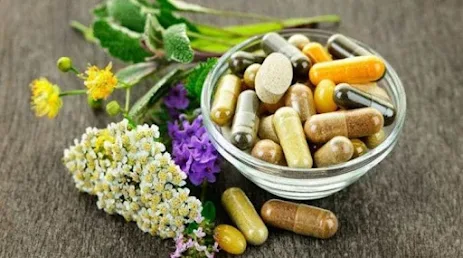Mixing Herbal ‘Remedies’ and other Supplements With Prescription Drugs can be Hazardous, Study Finds
A small study published this week in the British Journal of General Practice underscores the health risks that people expose themselves to when they take herbal medicines and other dietary supplements alongside prescription drugs.
RELATED: 5 Dangerous Food-Drug Interactions: Why Your Drugs Not Working
Although most of the combinations were not harmful, a significant proportion of them were. For example, some of the people in the study who had been prescribed a calcium channel blocker for high blood pressure acknowledged that they were also taking supplements containing St. John’s wort, an herb that can cause calcium channel blockers to be less effective.
Many people are unaware that herbal “medicines” and other over-the-counter dietary supplements can cause side effects or drug interactions.
People over the age of 65 are particularly at risk of experiencing a potentially harmful interaction as a result of combining such products with prescription drugs. Not only are they more likely to have been prescribed a medication by their doctor, but a large percentage of them also use alternative health products.
A 2017 review of 22 studies conducted in countries around the world, including in the United States, found that the concurrent use of prescription drugs and herbal and other dietary supplements was “substantial” among older adults.
Across the nine U.S. studies in the review, the proportion of older adults taking supplements ranged from 9.5 percent to 88.3 percent, depending on which herbal and dietary supplements were included.
ALSO READ: Your Doctor Prescribed WHAT? Get Insight
Study details
For the current study, researchers surveyed a randomly selected group of 149 British adults aged 65 and older. They were patients at two medical clinics — one rural, the other urban. All the participants were taking at least one prescription medication.
The survey asked people to list any “herbal medicinal products” or dietary supplements that they might also be using. The researchers then looked to see which people were at risk of those products interacting with their prescription medications.
The people in the study took an average of three prescription drugs. The most common ones were used to treat heart conditions and high blood pressure: statins, beta-blockers and calcium channel blockers.
A third of the participants also used an herbal product or other dietary supplement not prescribed by their physician. Women were almost twice as likely as men to do so. The number of herbal products or supplements taken by the participants ranged from one to eight, with an average of three.
The herbal products represented 36 different herbs (taken singly or in a combination product). The most commonly used ones were evening primrose oil, valerian, Nytol Herbal (a combination of hops, valerian, gentian, and passion flower) and garlic.
Eight out of 10 of the study’s participants took dietary supplements, including vitamins and minerals. Leading that list were cod liver oil, glucosamine, multivitamins and vitamin D.
Key findings
Half of the potential interactions identified in the study were not considered to pose any health concerns. But 21 of the combinations raised uncertain concerns, and six were found to be either potentially or significantly hazardous to health.
Here are the combinations identified in the study as being particularly risky:
Taking a calcium supplement in combination with levothyroxine, a prescription medication used to treat an underactive thyroid. The calcium may reduce levothyroxine’s effectiveness.
Taking peppermint capsules along with lansoprazole, a medication (a proton-pump inhibitor) used to treat conditions marked by too much acid in the stomach, such as gastroesophageal reflux disease (GERD). The lansoprazole can dissolve the protective coating of the capsules. Compounds in the peppermint can then relax the sphincter muscle between the stomach and the esophagus, allowing stomach acid to regurgitate into the throat and mouth.
Taking the herb St. John’s wort with amlodipine, a prescription drug (a calcium channel blocker) used to treat high blood pressure. St. John’s wort can make amlodipine (and other calcium channel blockers) less effective.
Taking the dietary supplement glucosamine with metformin, a prescription drug used to treat type 2 diabetes. Some research suggests that glucosamine may increase blood glucose concentrations.
Taking omega 3 fish oil supplements along with bisoprolol, a prescription drug (a beta blocker) used to treat high blood pressure. Research has raised concerns that this combination may cause blood pressure to lower too much.
Taking gingko with rabeprazole, a prescription drug (a proton-pump inhibitor) used to treat heartburn, stomach ulcers and GERD. Research suggests that ginkgo can make proton-pump inhibitors less effective.
READ MORE: 5 Commonly Used Medications That Could Be Killing Your S*x Drive
Tell your doctor
The study comes with caveats, of course. It was small and involved only British adults. Also, the study did not determine if the people in the study actually experienced any side effects or harm from combining herbal and other dietary supplements with prescription drugs. Still, the findings should be a reminder to all of us that “alternative” or “natural” health products are not without risk.
“Some patients do not consider [herbal medicinal products] and dietary supplements as medicines,” write the study’s authors. “Even when questioned, they may not always remember to disclose them.”
“This highlights the need for direct questioning and for healthcare practitioners to ask about use of those [herbal medicinal products] and supplements by name, which this research has shown to be most at risk of interactions,” they add.
And if your practitioner does not ask, volunteer the information yourself.
FMI: You can read the study in full on the website of the British Journal of General Practice.













